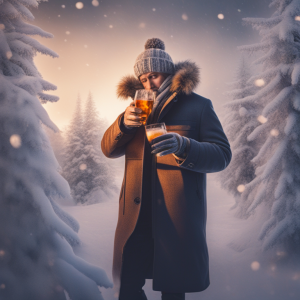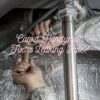Explore the Hidden Dangers of Drinking Alcohol in Freezing Weather Conditions
As we face the brutal challenges of winter, particularly in extremely cold climates, the instinct to seek warmth often leads to the perilous habit of consuming alcohol. It is essential to understand the significant risks associated with this behavior. This article aims to unveil the substantial dangers of drinking alcohol in icy environments, illustrating why this practice is not only hazardous but also fails to effectively maintain body heat. By expanding your knowledge of these risks, you can make better decisions that prioritize your safety and well-being throughout the harsh winter months.
Before delving into the dangers, it is crucial to dispel the common myth that alcohol serves as a warming agent. When alcohol is ingested, it causes dilation of blood vessels near the skin’s surface, which may create a misleading sensation of warmth. Although this feeling can be momentarily comforting, it does not fulfill the vital need to maintain a stable internal body temperature. In reality, the effects of alcohol can be harmful, impairing your ability to endure cold temperatures and dramatically increasing the risk of severe conditions such as hypothermia and other serious health issues that can arise in frigid conditions.
 One of the critical dangers linked to alcohol consumption in cold environments is the increased likelihood of dehydration. Alcohol is well-known as a diuretic, which means it promotes increased urine production, resulting in significant fluid loss. Furthermore, the cold air typically present in winter conditions is drier, causing our bodies to lose moisture at an accelerated rate. When these elements combine, they can lead to dangerously low hydration levels, which are vital for maintaining overall health and survival. Dehydration negatively impacts physical performance and cognitive functions, making it challenging to think clearly and make sound decisions during crucial moments.
One of the critical dangers linked to alcohol consumption in cold environments is the increased likelihood of dehydration. Alcohol is well-known as a diuretic, which means it promotes increased urine production, resulting in significant fluid loss. Furthermore, the cold air typically present in winter conditions is drier, causing our bodies to lose moisture at an accelerated rate. When these elements combine, they can lead to dangerously low hydration levels, which are vital for maintaining overall health and survival. Dehydration negatively impacts physical performance and cognitive functions, making it challenging to think clearly and make sound decisions during crucial moments.
Understanding the Impact of Alcohol on Decision-Making and Awareness in Cold Conditions
Another critical consequence of alcohol consumption is its ability to impair cognitive functions and decision-making skills. In survival situations, the capacity to make clear and rational choices is essential for ensuring personal safety. Alcohol can cloud judgment, rendering it increasingly difficult to respond effectively to potential hazards. This diminished capacity for reasoning can lead to accidents and poor choices, which can have devastating effects when facing extreme cold. Staying vigilant and aware of one’s environment is crucial; however, alcohol undermines this necessity, increasing the chances of mistakes that could endanger personal safety.
Moreover, alcohol severely disrupts the body’s natural temperature regulation systems. Upon consumption, alcohol causes blood vessels in the skin to expand, resulting in increased heat loss. Initially, this may create a temporary feeling of warmth, but over time, it accelerates the loss of core body heat, which is vital for survival. This creates a dangerous cycle where the fleeting warmth leads to a rapid decrease in core temperature, consequently elevating the risk of life-threatening conditions such as hypothermia. It is essential to recognize that although alcohol might seem to provide quick relief from the cold, it ultimately heightens vulnerability to severe cold-related health risks.
Recognizing the Alarming Connection Between Alcohol Use and Hypothermia Risk
When considering the dangers of hypothermia, it is important to understand how alcohol consumption can obscure the initial warning signs of this potentially life-threatening condition. Hypothermia occurs when the body’s core temperature drops below the normal range, typically below 95 degrees Fahrenheit (35 degrees Celsius). Early symptoms may include shivering, confusion, fatigue, and impaired coordination. However, alcohol consumption suppresses the body’s natural responses, making it increasingly challenging to recognize these critical indicators. By the time the symptoms of hypothermia become noticeable, it could be too late to prevent serious injury or even fatal outcomes.
In winter survival situations, there are numerous safer and more effective alternatives to alcohol for maintaining warmth. Here are several strategies that can significantly enhance your ability to stay warm and safe:
1. Dress in Layers for Maximum Warmth and Comfort: Wearing multiple layers of clothing is crucial for effectively trapping warm air. Start with thermal base layers to wick moisture away, add insulating mid-layers for heat retention, and finish with a windproof and waterproof outer layer to create a barrier against the cold.
2. Keep Your Clothing and Footwear Completely Dry: Moisture can lead to rapid heat loss, so it’s essential to ensure your clothing and footwear are dry at all times. Opt for waterproof materials and change into dry garments whenever necessary to help maintain warmth and comfort.
3. Insulate Yourself from the Cold Ground Effectively: Utilizing sleeping mats or insulation pads can greatly reduce heat loss, especially during rest periods. This measure is vital for conserving body heat during prolonged exposure to cold conditions.
4. Opt for Warm, Non-Alcoholic Beverages: Instead of alcohol, consider consuming hot drinks such as tea, coffee, or hot chocolate. These beverages provide warmth without the detrimental side effects associated with alcohol consumption, helping to maintain hydration and body heat.
5. Seek or Build Shelter for Enhanced Protection: Actively finding or constructing a shelter can greatly reduce exposure to harsh winds and freezing temperatures. A well-constructed shelter is essential for retaining body heat, significantly improving your chances of staying warm and safe.
6. Fuel Your Body with High-Calorie, Nutrient-Rich Foods: Consuming nutrient-dense foods that are high in calories can provide your body with the necessary energy to produce heat. Foods such as nuts and fatty fish are excellent sources of healthy fats that can be particularly beneficial in cold weather scenarios.
Gaining a thorough understanding of the dangers linked to alcohol consumption in freezing temperatures is crucial for anyone involved in winter survival situations. Despite the fleeting sensation of warmth, alcohol can lead to dehydration, impaired judgment, disrupted temperature regulation, and can obscure the symptoms of hypothermia. By avoiding alcohol and implementing safe, effective strategies, we can significantly enhance our chances of surviving and thriving in extreme winter conditions. Stay alert, prepare thoroughly, and prioritize your safety above all else.
The post Hazards of Alcohol Consumption in Extreme Cold Conditions appeared first on Survival Bite.
The Article Alcohol Consumption Hazards in Extreme Cold Conditions Was Found On https://limitsofstrategy.com
The Article Alcohol Consumption Risks in Severe Cold Weather First Appeared ON
: https://ad4sc.com









Comments are closed